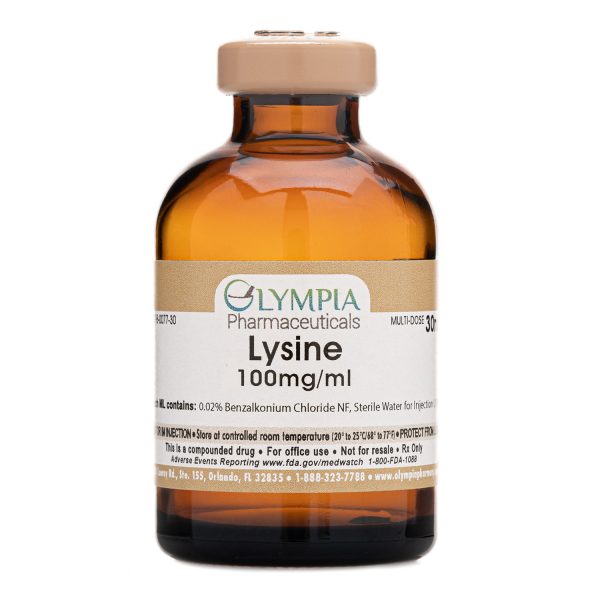
Lysine is one of the nine essential amino acids in the human body, which act as the building blocks of proteins. Lysine is necessary to healthy growth and plays an essential role in the production of carnitine, which is critical to several processes in the human body, including healthy heart and brain function. Since the body cannot synthesize lysine, adequate levels of the amino acid must be obtained from dietary sources and supplementation. Our body’s main source of lysine is a well-balanced diet. Good dietary sources of lysine are protein-rich foods such as eggs, meat (specifically red meat, lamb, pork, and poultry), soy, beans, peas, cheese (particularly Parmesan), and certain fish (such as cod and sardines). Lysine may be used for athletic performance, symptoms of diabetes, managing symptoms of the herpes virus (cold sores), and more. Lysine is taken orally, topically, or intravenously. According to research by Knopf et al1, there is evidence that lysine, when administered intravenously, can significantly increase the amount of circulating of growth hormones. This has led to athletes using lysine as a means of promoting muscle growth while training. L-lysine also helps the body to absorb calcium. Because of this, it is also used in the treatment of osteoporosis.
Lysine may be effective in the treatment of cold sores due to the herpes simplex virus.
Its use has been suggested for diabetes, stress, and athletic performance improvement. Lysine is a precursor of carnitine. It may also help the body absorb calcium and form collagen.
Dosage: Seek advice from a licensed physician, medical director, or other healthcare provider
Concentration: 100mg/ml
Route of Administration: IV/IM
L-lysine is contraindicated in patients with renal (kidney) or hepatic (liver) disease. It should also be avoided by those already with too much lysine in the blood or urine. As lysine is still a drug under active study, those who are pregnant or breastfeeding should also avoid taking supplemental lysine until there is further research done regarding its safety for infants and children.
Do not start or stop taking lysine without talking to a physician. Calcium supplements should not be taken along with lysine due to the increased absorption and reduced elimination of calcium.
Some common side effects include:
Store at controlled room temperature. Protect from light.

Get your dream body now, pay later with Cherry!
Choose your payment plan before your next appointment- won’t harm your credit!

Get your dream body now, pay later with Cherry!
Choose your payment plan before your next appointment- won’t harm your credit!
7155 East Main Street, Scottsdale, AZ 85251
Phone: 602-456-9201
Text: 602-492-5736
E-mail: info@studio48medspa.com
Monday – Thursday 9:00 AM – 6:00PM
Friday: 9:00 AM – 3:30 PM
Every other Saturday: 9:30 AM – 4:00 PM
Sunday: Closed
*Studio 48 Medspa Scottsdale’s hours of operation are subject to change. Please call or book your appointment ahead of time to ensure availability. Walk – ins are welcome, but service availability is not guaranteed.